Lewis Hamilton's seventh title bid heads a potentially historic Formula 1 season
- Published
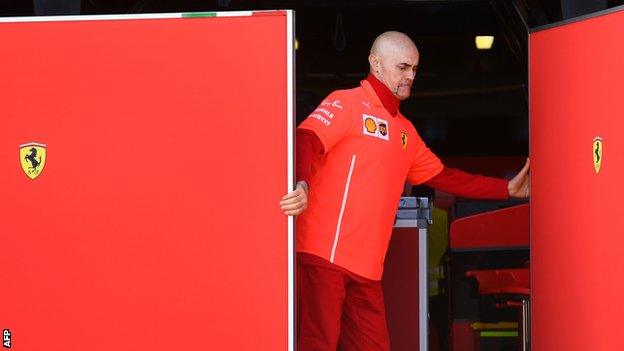
Sunday's Australian GP is live on 5 live and the BBC Sport website at 05:10 GMT
The Formula 1 season will start in Australia this weekend amid a climate of uncertainty, anxiety and distrust.
There is anxiety over the global coronavirus outbreak, which has led to the postponement of the fourth race of the season, in China, and forced the second - in Bahrain - to be held behind closed doors.
There is uncertainty over just how significantly the virus could affect the season.
And there is distrust rooted in a major row between seven of the teams and the governing body over legality questions surrounding last year's Ferrari engine.
This is all happening with F1 on the brink of two significant landmarks.
The first is individual: Lewis Hamilton is shooting for a seventh drivers' world championship title, which would draw him level with Michael Schumacher.
The second is collective: As the sport celebrates 70 years of the world championship, this season will see the fastest cars in its history, before a new-look F1 in 2021 is expected to add seconds to lap times.
While the competition is being fought out on track at record speeds, the action behind the scenes will be just as frenetic.
There is the potential for a major shake-up in the driver market, as most of the big names - including Hamilton - have their contracts coming up for renewal. And there are some significant aspects of the plans for 2021 still to be finalised.
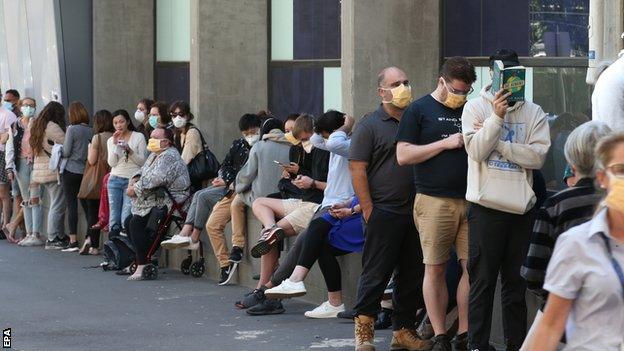
F1 testing: People of Melbourne line up to be tested for Covid-19 at the city's Royal Hospital
The coronavirus threat
Sunday's Australian Grand Prix in Melbourne is going ahead, or so it appears at the time of writing. In F1, it's normally a time of celebration and excitement as teams come out of their winter hiding and find out exactly where they stand heading into the long season.
This year, that anticipation is still there, but it is tempered by concern, as many in the sport ponder the implications of Covid-19.
Should F1 really be allowing 4,000 or so officials, team members and media to fly halfway around the world to hold a race in front of nearly 100,000 spectators at this time of global concern?
Governing body the FIA might have set up a "crisis cell" that meets every two days to analyse the coronavirus situation and their most appropriate response to it. But not everyone will agree that their current approach - which basically amounts to, 'let's keep an eye on things, but plough on pretty much as usual and hope for the best' - is appropriate.
How many more races will be affected as the world battles to get the coronavirus under control?
Even Bahrain, in holding its grand prix behind closed doors, is giving out mixed messages, by waiving its own restrictions on travellers from outbreak-hit parts of the world - including Italy - to let in F1 personnel who are from or have travelled through those countries.
It is a situation that develops by the day, and in response to individual governments' handling of the virus.
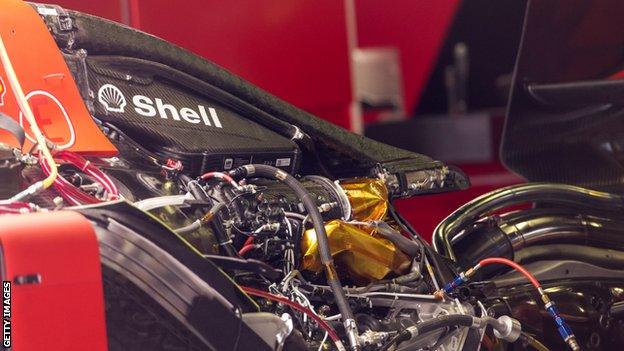
Ferrari had the quickest car on the straights for much of last season
The Ferrari engine row
This opening race of the season looks like being a bad-tempered one.
Seven teams have come together to demand answers from the FIA as to why it failed to take action against Ferrari despite admitting suspicions that their engine was not always run legally in 2019.
Those teams also want to know why the settlement reached was confidential, with the FIA having concluded pursuing the matter was pointless because it would have been impossible to prove wrongdoing.
So far, there has been a back-and-forth exchange of media releases, but the seven teams are iron-determined to get answers.
There are two key issues:
Was the integrity of the competition undermined last year - i.e, did Ferrari win races they should not have?
Transparency of and trust in the governing body, which could have a knock-on effect on the negotiations over the signing of the team's new contracts with F1 for the five-year period from 2021.
The seven have set the FIA a deadline to respond to a series of questions, while the governing body has publicly backed its officials' handling of the matter in what the seven have interpreted as a show of strength by president Jean Todt.
The issue is likely to dominate at least the start of the Melbourne weekend and appears some way from being resolved.

Hamilton and the quest for seven
Hamilton starts the season as the hot favourite to win the drivers' championship, based on the historic form of his partnership with Mercedes, now established as the most successful team in the history of the sport.
Their new car, the W11, has run impressively in testing, and features eye-opening technical innovations. All of Hamilton's rivals are aware of the imposing nature of their task in trying to unseat him.
But while the outside world will focus on whether Hamilton can match Schumacher, the man himself says he has little time for records and statistics.
"It's not something I think about," Hamilton said at the final pre-season test. "I always say that numbers are not really a massive thing for me. I plan to be here a little bit longer so hopefully I'll get there. We shall see."
The story behind Lewis Hamilton's tattoos
Nor is he concerned about the fact that he has a target on his back for the ambitious young stars of Red Bull and Ferrari - Max Verstappen and Charles Leclerc - to aim at.
"If I was to look at it this way, then I've had a target on my back since the day I won my first championship when I was 10 years old," Hamilton said. "So it's nothing new to me.
"I was the only black driver there and I've always generally been at the front of championships so it's no different in the last 20 years of driving. I'm quite comfortable in that space.
"It's almost a positive when people are targeting you and looking to try to beat you - because you want everyone to bring their A-game so that if you do manage to pull it off and finish ahead, it feels even better."
At 35, Hamilton is in a very good place as a sportsman. His desire to win is unsated. His electrifying pace is matched with maturity and guile. Trust between driver and team is implicit. His team-mate Valtteri Bottas is keen to unseat him, but has made it clear he won't play the psychological games employed by his predecessor Nico Rosberg to get under Hamilton's skin.
In a harmonious environment in which he can focus on his task with minimal distractions, Hamilton will be very tough to beat.
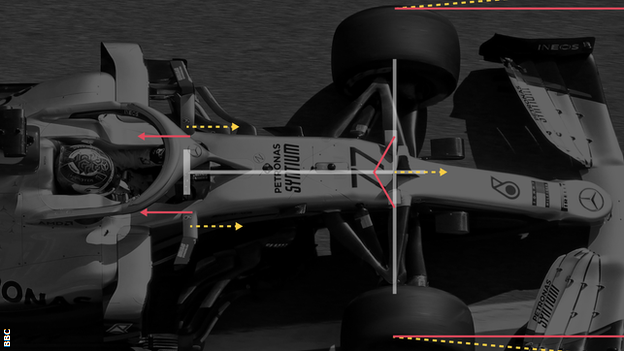
Mercedes' new design innovation is DAS (Dual-axis steering): Typically the front wheels on an F1 car are mounted at an outward-facing angle to help with cornering (yellow dotted line) - this system adjusts them to be more centred (red line) travelling down the straights when the driver pulls back the steering wheel, creating less friction
The pretenders
Verstappen set out his stall for 2020 some weeks ago, when he declared of Hamilton: "He is definitely one of the best out there but he is not God. Maybe God is with him, but he is not God."
The provocative remarks did not go unnoticed by Hamilton, who responded: "I find it funny seeing that. I have just always known to do my talking on the track. I tend to see that as a sign of weakness."
Verstappen heads into the season as the man many will see as the most likely to unseat Hamilton, if anyone can. The prospect of a battle between the two is mouth-watering.
When he builds up a head of steam, Verstappen is like a force of nature, and his determination, confidence, speed and hard-headedness would seem to stand him in good stead.
But his ability to challenge depends on whether his team, and engine partner Honda, have upped their game to a point where they can threaten Mercedes every weekend, rather than every now and again.
If Verstappen is at the head of the new generation out to unseat Hamilton, Leclerc is right in his slipstream.
In his debut season with Ferrari in 2019, Leclerc beat his four-time champion team-mate Sebastian Vettel on every metric and scored more pole positions than anyone else in the field.
Leclerc was last year in only his second season in F1, and he made too many mistakes. He needs to cut them out, but he ought to be involved in the title fight, if Ferrari's car is up to the task. But is it?
Team boss Mattia Binotto has been insistent that Ferrari are behind Mercedes, and he says it is not some elaborate ploy to downplay expectations to minimise pressure.
"I don't think it's a relief of pressure," he said. "When you're not going as fast as you would like or you should, you get the pressure. As Ferrari, we only have one objective. If you are not reaching it, you cannot be relieved.
"We're not playing games; this is our true performance at the moment. How good or bad it is, it's only after the first three races we will have a clearer picture. The pressure is there. The pressure should be seen as a motivation, not a drama."
For all Ferrari's coyness, though, there were some suggestions from the car's long runs late in testing that it was right up there. Certainly Mercedes are expecting a tough fight from both Ferrari and Red Bull.
Vettel, meanwhile, faces a critical season. At his best, he is formidable. But his Ferrari contract is up for renewal and, after losing out to Leclerc in 2019, he faces a fight for his status in the sport, regardless of his enviable record.
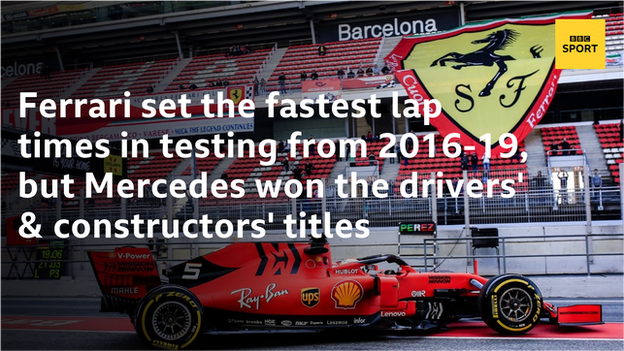
The driver market
Vettel's future will be at the heart of what is known in F1 as the 'silly season' this summer, with only Verstappen and Leclerc sure of what they will be doing in 2021 after signing long-term deals with their teams over the winter.
All the other top drivers - Hamilton, Bottas, Vettel and Renault's Daniel Ricciardo - are out of contract, along with a number of other drivers up and down the pit lane.
Hamilton is expected to stay where he is, assuming Mercedes stay in F1 - and team boss Toto Wolff has described reports that the board are considering their future as "complete nonsense".
If Hamilton stays, do Mercedes stick with Bottas as his team-mate, or look elsewhere?
Ferrari say Vettel is their "first choice at the moment", but many questions surround that. After the tensions of 2019, do Ferrari really want two 'A-listers' in the same team? If Leclerc is again quicker than Vettel on balance, could the German accept a supporting role? Given his pride at his achievements so far, the likely answer is no.
If Vettel left, who would Ferrari replace him with? The obvious candidate is Ricciardo, whose light-hearted, good-humoured personality tends to alleviate the pressure created by intra-team competition.
The Australian, who has not had the success he hoped for when he left Red Bull in 2018, says his priority is to stay at Renault and make it work, but he added the caveat that it was as long as he "gets enough out of this year" - ie, that the team show some forward momentum again.
Last year, Renault's Nico Hulkenberg was the man who found himself without a chair when the music stopped. Who will it be in 2020?
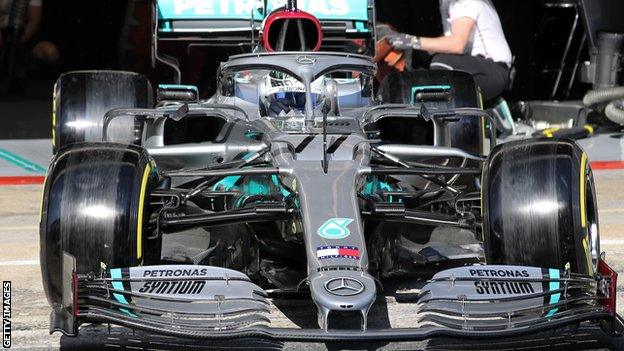
Warning: Tyres will be a talking point again this season
The behind-the-scenes stuff
The 2021 technical regulations were finally published last October after many months of wrangling, but several issues still need to be resolved before the start of F1's new era next year.
Firstly, the new revenue split and governance systems have yet to be finalised, even if it seems a resolution is close.
Any doubts over the presence of Red Bull and Ferrari in 2021 seem to have been alleviated by the length of the contracts they have signed with Verstappen and Leclerc.
But there are questions over the future of Renault, whose board are undertaking a company-wide review of activities; Honda, who last autumn committed to Red Bull only until 2021; and the US-based Haas team. Even Mercedes' presence cannot be taken for granted, in the context of the cuts being made by the Daimler group.
Beyond that, perhaps the single most important aspect of finalising 2021 is the tyres. F1's new rules fundamentally change how F1 cars work, and have been formulated with the intention of allowing them to race closer together.
The tyres need their own redesign to facilitate this. In particular, they need to be much less sensitive to heat, a characteristic which forces drivers to drive seconds off the pace in races to make the tyres last required stint lengths, and which prevents close racing over extended periods. It's fair to say there is scepticism among drivers and teams as to Pirelli's ability to deliver.
Hamilton has been outspoken on this issue for a while, part of a deliberate strategy by the Grand Prix Drivers' Association to keep the pressure on Pirelli. And seeing as the drivers have been complaining about the thermal sensitivity of the tyres since at least 2015, they have been unimpressed by claims last year that this was a new topic.
"Racing is what needs to improve," Hamilton said. "I think reduce aero and give us better tyres. That's a very, very important line there. We need better tyres.
"We've been talking for years and years and years about tyre degradation, thermal degradation, and we sat in the meeting room with Pirelli in Brazil [last November] and [they said:] 'We've never heard about thermal deg; that's the first time we hear about it.'" At this point, Hamilton laughed.
"We're trying to communicate with them better," he added. "I hope for 2021 that we have a better target and one that they are able to meet."
If all this sounds esoteric, think again.
If the tyres cannot be made to work in the way the F1 drivers want, the whole point of the 2021 rules will have been undermined. Why produce more 'raceable' cars, after all, if the tyres prevent them doing that racing?
